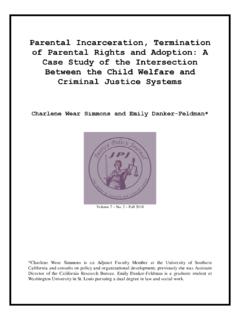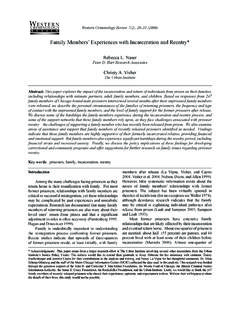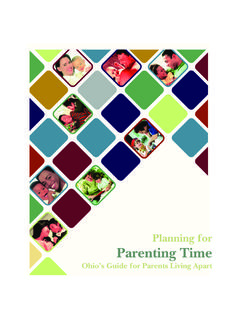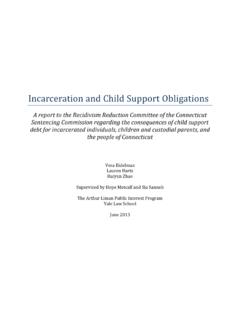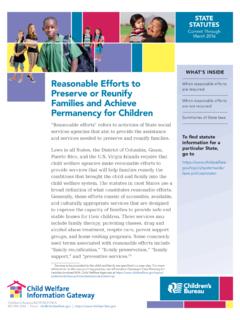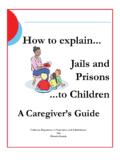Transcription of The Adverse Childhood Experiences - qicct.org
1 The Adverse Childhood Experiences of Very Young children and Their Parents Involved in Infant Toddler Court Teams Introduction The Centers for Disease Control and Prevention-Kaiser Permanente Adverse Childhood Experiences (CDC-Kaiser Permanente ACEs) study one of the largest investigations of Childhood abuse and neglect and later-life health found that Experiences in early Childhood were powerful predictors of adult health, functioning, and As the number of ACEs increases, so does the development of risk factors for disease and other negative outcomes.
2 ACEs are strongly related to well-being throughout the life ACES are stressful or traumatic events, categorized into three areas: abuse (physical, emotional, and sexual), neglect (physical and emotional), and household dysfunction (mental illness, separation and divorce, domestic violence, incarcerated household member, and substance abuse). Later, the original ACEs study was extended to add the stressful traumatic events for young children living in These events include racial discrimination and exposure to community violence. It was one of the first studies to examine ACEs in a racially and socioeconomically diverse urban population.
3 Prevalence of standard ACEs are higher in Philadelphia than in the original Kaiser Permanente By examining adults' reports of Experiences in Childhood , the CDC-Kaiser Permanente ACEs study revealed that the majority of children experience 1 or more ACEs, and 25 30%. experience 3 or more Focusing on the child welfare population specifically, findings from a study of children either placed in foster care or adopted from foster care indicated that children in foster care are more likely to experience ACEs than children with socioeconomic disadvantages and different family Results from this study can help to improve our understanding of and shape policies and practices that address how children in foster care, an already vulnerable population.
4 Are disproportionately exposed to Every experience in early Childhood has an influence on a child's brain development and impacts their social, emotional, and physical health. Positive Experiences promote favorable infant and early Childhood mental health development, and negative environmental Experiences adversely impact brain When young children feel safe, they can venture out from their parents' arms to explore the world; curiosity is possible only when children have Quality Improvement Center for Research-Based Infant-Toddler Court Teams | 1. The Adverse Childhood Experiences of Very Young children and Their Parents Involved in Infant Toddler Court Teams stable, nurturing relationships with their primary caregivers.
5 Conversely, exposure to negative Experiences forces them to activate their fight or flight responses, barring the way to safe exploration and teaching them that the world is a dangerous and frightening place. Researchers, policymakers, and practitioners continue to advance in understanding the long-term impact of early Experiences on a young child's development. We recognize the importance of ensuring that courts and states have the necessary tools to identify and address the underlying challenges faced by young children and families in the child welfare system.
6 It is important, however, to recognize that trauma and Adverse Experiences in early Childhood do not have to prescribe a child's future because of the presence of both protective and promotive influences that contribute to resilience. Child characteristics, family factors, and community support all contribute to more positive outcomes following trauma and other Infants and young children who are better able to regulate their behaviors and emotions are more likely to show resilience in the face of Families in which there is less stress and in which parents or caregivers can provide consistency, warmth, and support are more likely to have children who are better able to cope and overcome challenges in the face of adversity.
7 Young children need healthy attachment relationships to develop the adaptive resources that help them develop and adjust in school and in life. Further, it is very important to recognize the role that community and social supports play in promoting positive outcomes. Findings From the Quality Improvement Center for Research- Based Infant Toddler Court Teams and Safe Babies Court Team . The Quality Improvement Center for Research-Based Infant Toddler Court Teams (QIC-CT) is leading an effort in information-sharing and knowledge-building to help ensure that jurisdictions and states have the tools necessary to identify and address the underlying challenges faced by families in the child welfare system and to ensure that infants, toddlers, and families have access to high-quality, evidence-based services.
8 The QIC-CT supports work in 11 sites around the United States to implement and institutionalize an innovative approach, based on the ZERO TO THREE Safe Babies Court Team (SBCT) approach. The QIC-CT court teams have focused on the ACEs of very young children in foster care as well as the ACEs of parents. From a prevention standpoint, we work collaboratively to develop intervention and treatment plans that reduce the risk of ACEs in very young children . It is important to be sensitive when administering the ACEs survey to parents of young children in infant toddler court teams.
9 Best practices in administering the survey with this population include: ongoing review and gathering of responses for the survey being carried out over time, as a community coordinator or other trusted partner collecting the data learns about new risk factors. The 10 ACEs questions are personal and must be asked in a sensitive and empathetic Quality Improvement Center for Research-Based Infant-Toddler Court Teams | 2. The Adverse Childhood Experiences of Very Young children and Their Parents Involved in Infant Toddler Court Teams manner. Because it takes time to build a trusting relationship, the ACEs questions are better asked over time in the life of the case by someone with whom the parent has developed rapport.
10 It may be that several encounters will be required to obtain the answers to all 10 questions. The SBCT and QIC-CT court teams collected data from April 2015 through June 2017 on the ACEs scores of children and parents served by the SBCT and the court teams of QIC-CT, using the original 10-question CDC-Kaiser Permanent ACE Data below includes survey responses from 218 parents from 8 states. QIC-CT staff also completed surveys for 313. children , from birth to 3 years old. In creating a protocol for the survey of children 's ACEs for court teams, certain definitions were instituted: 1.
